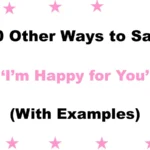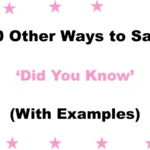Expressing gratitude sincerely when someone shares valuable information is a simple yet powerful way to build trust and connection. While saying “Thank you for the information” is common, exploring alternative phrases can help you communicate with more warmth, personality, and thoughtfulness.
These alternatives not only make your appreciation feel more personal and genuine, but they also enhance the clarity and tone of your message, whether in professional or casual conversations. Knowing the right way to say thanks in different situations can set the stage for better communication and stronger relationships. Below, we explore 30 meaningful alternatives, plus helpful guidance on when and how to use them.
What Does “Thank You for the Information” Mean?
At its core, “Thank you for the information” expresses appreciation for the knowledge or details someone has provided. It acknowledges their effort to share something useful or relevant, showing respect for their time and contribution. This phrase is straightforward, polite, and widely understood, serving as a fundamental tool for effective communication.
When to Use “Thank You for the Information”
Use “Thank you for the information” anytime someone gives you data, insight, or clarification that helps you understand a situation better. It’s appropriate in emails, conversations, meetings, and even casual chats. The phrase fits professional settings such as work reports or client interactions, as well as personal scenarios where you want to acknowledge helpful facts or updates.
Is It Professional/Polite to Say “Thank You for the Information”?
Yes! Saying “Thank you for the information” is both professional and polite. It conveys gratitude in a clear and respectful way. However, depending on the context, varying your phrasing can make your message feel more engaging and thoughtful, which can be especially valuable in customer service, teamwork, or networking situations.
Pros and Cons of Saying “Thank You for the Information”
Pros:
- Simple and clear
- Universally understood
- Polite and respectful
Cons:
- Can feel repetitive or generic
- May lack warmth or personality
- Might seem overly formal in casual contexts
Synonyms for “Thank You for the Information”
- I appreciate the details you shared
- Thanks for the update
- I’m grateful for the insight
- Many thanks for the data
- Thank you for keeping me informed
- I value the information you provided
- Thanks for the heads-up
- I appreciate your input
- Thank you for the clarification
- Thanks for filling me in
- I’m thankful for the explanation
- Appreciate the valuable info
- Thanks for sharing that with me
- I’m grateful for your feedback
- Thank you for your guidance
- Thanks for bringing that to my attention
- I appreciate the briefing
- Thanks for the comprehensive overview
- I’m thankful for your support
- Thanks for the details
- I appreciate your assistance
- Many thanks for the helpful information
- Thanks for the summary
- I’m grateful for the report
- Thanks for the scoop
- Thank you for the enlightenment
- I appreciate your contribution
- Thanks for the info update
- Thank you for the message
- Thanks a lot for the insight
1. I appreciate the details you shared
Definition: Acknowledging and valuing the specific information provided.
Explanation: This phrase highlights your recognition of the effort the other person made to give you useful details. It shows attentiveness to the content shared.
Scenario example: After receiving a detailed project update from a colleague: “I appreciate the details you shared; it really helps clarify our next steps.”
Best Use: Formal and semi-formal contexts where you want to show attentiveness and respect.
Worst Use: Casual settings where simpler phrases might be more natural.
Tone: Warm, respectful, and professional.
2. Thanks for the update
Definition: Expressing gratitude for recent information or news provided.
Explanation: This is a concise, friendly way to acknowledge that someone has kept you informed about recent developments.
Scenario example: After a manager emails progress on a task: “Thanks for the update! Looking forward to the next phase.”
Best Use: Informal to semi-formal settings; quick acknowledgments.
Worst Use: Situations needing deeper appreciation or formality.
Tone: Casual, friendly, efficient.
3. I’m grateful for the insight
Definition: Thanking someone for providing understanding or perspective.
Explanation: This phrase emphasizes appreciation for knowledge that deepens your understanding, beyond just raw data.
Scenario example: After a mentor explains a complex concept: “I’m grateful for the insight you shared; it really opened my eyes.”
Best Use: Educational, mentoring, or advisory contexts.
Worst Use: When the information shared is purely factual without deeper interpretation.
Tone: Thoughtful, appreciative, sincere.
4. Many thanks for the data
Definition: Expressing gratitude for factual or numerical information provided.
Explanation: This acknowledges the value of concrete facts or statistics someone has supplied.
Scenario example: After receiving sales figures from a team member: “Many thanks for the data; it’s very helpful for our analysis.”
Best Use: Formal or professional settings involving reports, research, or analytics.
Worst Use: Informal chats or non-technical conversations.
Tone: Polite, formal, appreciative.
5. Thank you for keeping me informed
Definition: Appreciation for ongoing updates or communication.
Explanation: Shows gratitude for continuous sharing of information, emphasizing the relationship and ongoing dialogue.
Scenario example: After regular project emails: “Thank you for keeping me informed throughout the process.”
Best Use: Professional relationships or situations requiring regular updates.
Worst Use: One-time or very casual information exchanges.
Tone: Courteous, respectful, engaged.
6. I value the information you provided
Definition: Expressing that the shared information is important and appreciated.
Explanation: This phrase communicates a deeper appreciation by emphasizing the significance of the information given.
Scenario example: After receiving strategic advice from a colleague: “I value the information you provided; it will greatly influence our next steps.”
Best Use: Formal or semi-formal communication where you want to highlight importance.
Worst Use: Casual or informal exchanges where it might sound overly serious.
Tone: Respectful, sincere, thoughtful.
7. Thanks for the heads-up
Definition: Informal thanks for a warning or advance notice.
Explanation: This phrase shows gratitude for timely information that helps you prepare or avoid problems.
Scenario example: “Thanks for the heads-up about the meeting time change. I’ll adjust my schedule.”
Best Use: Casual or friendly professional environments.
Worst Use: Formal or very serious contexts, where it might appear too casual.
Tone: Friendly, informal, appreciative.
8. I appreciate your input
Definition: Thanking someone for their contribution or opinion.
Explanation: This phrase is useful when the information shared is more of an opinion, suggestion, or advice rather than pure facts.
Scenario example: “I appreciate your input on the project proposal; it really helped improve the plan.”
Best Use: Collaborative and team environments.
Worst Use: When factual information, not opinion, is shared.
Tone: Collaborative, respectful, warm.
9. Thank you for the clarification
Definition: Expressing gratitude when someone clears up confusion or misunderstanding.
Explanation: This phrase is perfect for situations where information helps resolve doubts or uncertainties.
Scenario example: “Thank you for the clarification on the budget details; now everything makes sense.”
Best Use: Formal and informal contexts where misunderstanding needs to be addressed.
Worst Use: When no confusion exists or when new information is just being introduced.
Tone: Polite, appreciative, precise.
10. Thanks for filling me in
Definition: Informal thanks for being updated or informed about details.
Explanation: A casual phrase showing appreciation for being kept in the loop.
Scenario example: “Thanks for filling me in on what happened at the meeting.”
Best Use: Casual workplace conversations or social settings.
Worst Use: Formal emails or official reports.
Tone: Friendly, informal, approachable.
11. I’m thankful for the explanation
Definition: Showing appreciation for detailed or clear information that helped you understand something better.
Explanation: This phrase works well when the information shared clarifies or educates.
Scenario example: “I’m thankful for the explanation of the new software features; it’s much clearer now.”
Best Use: Educational, training, or mentoring situations.
Worst Use: When information is brief or factual with no explanation.
Tone: Thoughtful, respectful, sincere.
12. Appreciate the valuable info
Definition: Informal way of expressing gratitude for important information.
Explanation: This is a succinct phrase acknowledging the usefulness of the information.
Scenario example: “Appreciate the valuable info you sent over about the event.”
Best Use: Friendly professional or casual communications.
Worst Use: Highly formal contexts.
Tone: Casual, warm, direct.
13. Thanks for sharing that with me
Definition: Expressing gratitude for information that was shared personally or thoughtfully.
Explanation: This phrase emphasizes the personal aspect of information exchange.
Scenario example: “Thanks for sharing that with me; I hadn’t considered that angle before.”
Best Use: Semi-formal or informal interactions.
Worst Use: Situations requiring formal acknowledgment.
Tone: Warm, conversational, appreciative.
14. I’m grateful for your feedback
Definition: Thanking someone for their opinion or evaluation.
Explanation: This phrase is ideal when information comes as a critique or suggestion.
Scenario example: “I’m grateful for your feedback on my presentation; it really helped improve it.”
Best Use: Work reviews, collaborative projects, or mentoring.
Worst Use: When only factual information is shared without evaluation.
Tone: Professional, sincere, respectful.
15. Thank you for your guidance
Definition: Expressing appreciation for direction or advice provided.
Explanation: This phrase acknowledges that the information helped guide your decisions or actions.
Scenario example: “Thank you for your guidance throughout the project; it made a big difference.”
Best Use: Mentoring, leadership, or advisory contexts.
Worst Use: Simple factual updates or information.
Tone: Respectful, formal, appreciative.
16. Thanks for bringing that to my attention
Definition: Expressing gratitude for highlighting important information or issues.
Explanation: This phrase shows that you appreciate someone making you aware of something you might not have noticed.
Scenario example: “Thanks for bringing that to my attention; I’ll make sure it gets addressed.”
Best Use: Work-related communications where issues or details need to be highlighted.
Worst Use: When information is routine or already known.
Tone: Polite, attentive, professional.
17. I appreciate the briefing
Definition: Thanking someone for a summary or overview of information.
Explanation: This phrase is best when the information shared is a concise summary of a topic or situation.
Scenario example: “I appreciate the briefing on the project status; it helped me catch up quickly.”
Best Use: Business meetings, project updates, and official communications.
Worst Use: When detailed explanations or personal opinions are shared.
Tone: Formal, professional, courteous.
18. Thanks for the comprehensive overview
Definition: Expressing gratitude for detailed and thorough information.
Explanation: This phrase praises the depth and completeness of the information given.
Scenario example: “Thanks for the comprehensive overview of the campaign; it’s very helpful.”
Best Use: Formal presentations or in-depth reports.
Worst Use: Brief or informal information sharing.
Tone: Formal, appreciative, respectful.
19. I’m thankful for your support
Definition: Expressing gratitude for helpful information that also offers encouragement or assistance.
Explanation: This phrase conveys thanks not only for facts but also for the backing or help provided.
Scenario example: “I’m thankful for your support and the information you provided during this process.”
Best Use: Teamwork, mentoring, or customer service.
Worst Use: Purely transactional information exchanges.
Tone: Warm, supportive, sincere.
20. Thanks for the details
Definition: A simple, appreciative phrase for receiving specific pieces of information.
Explanation: This phrase acknowledges receipt and appreciation of particular facts or elements.
Scenario example: “Thanks for the details on the schedule; that clears things up.”
Best Use: Casual to semi-formal conversations.
Worst Use: When a more formal or detailed acknowledgment is required.
Tone: Friendly, polite, straightforward.
21. I appreciate your assistance
Definition: Expressing thanks for help provided through information or action.
Explanation: This phrase blends gratitude for information with recognition of helpfulness.
Scenario example: “I appreciate your assistance in providing the necessary documents.”
Best Use: Customer service, professional help, or teamwork.
Worst Use: Casual, purely informational conversations.
Tone: Formal, respectful, appreciative.
22. Many thanks for the helpful information
Definition: A warm and polite way to express gratitude for useful details.
Explanation: This phrase emphasizes the helpfulness and usefulness of the information shared.
Scenario example: “Many thanks for the helpful information on the new policies.”
Best Use: Formal and semi-formal communication.
Worst Use: Informal chats or very brief updates.
Tone: Polite, courteous, professional.
23. Thanks for the summary
Definition: Expressing gratitude for a brief and clear recap of information.
Explanation: This phrase is perfect when someone condenses complex information into an easy-to-understand summary.
Scenario example: “Thanks for the summary of today’s meeting; it was very clear.”
Best Use: Professional meetings and updates.
Worst Use: When detailed or comprehensive information is provided instead.
Tone: Formal, polite, appreciative.
24. I’m grateful for the report
Definition: Thanking someone for a formal or detailed presentation of information.
Explanation: This phrase suits contexts where information is delivered in a structured, official format.
Scenario example: “I’m grateful for the report you prepared on market trends.”
Best Use: Business, academic, or official communications.
Worst Use: Casual or informal information exchanges.
Tone: Formal, respectful, professional.
25. Thanks for the scoop
Definition: Informal thanks for receiving inside or exclusive information.
Explanation: This casual phrase is often used when the information shared feels like a special or privileged update.
Scenario example: “Thanks for the scoop on the upcoming product launch!”
Best Use: Friendly, informal conversations.
Worst Use: Formal or professional contexts.
Tone: Casual, enthusiastic, friendly.
26. Thank you for the enlightenment
Definition: Expressing deep gratitude for information that broadens understanding or changes perspective.
Explanation: This phrase conveys thanks for revealing something eye-opening or illuminating.
Scenario example: “Thank you for the enlightenment on the cultural nuances of this project.”
Best Use: Educational or reflective contexts.
Worst Use: Casual or transactional information sharing.
Tone: Thoughtful, respectful, sincere.
27. I appreciate your contribution
Definition: Thanking someone for their part in providing valuable information or ideas.
Explanation: This phrase acknowledges the person’s role in adding value through information.
Scenario example: “I appreciate your contribution to the research with such detailed data.”
Best Use: Teamwork, research, collaborative projects.
Worst Use: When information is one-sided or minimal.
Tone: Respectful, professional, appreciative.
28. Thanks for the info update
Definition: Informal thanks for a recent piece of information.
Explanation: A quick, casual phrase to acknowledge receipt of new information.
Scenario example: “Thanks for the info update on the schedule change.”
Best Use: Casual workplace or friendly exchanges.
Worst Use: Formal communication or lengthy reports.
Tone: Casual, direct, polite.
29. Thank you for the message
Definition: General thanks for receiving a communication that contains information.
Explanation: This phrase is useful when you want to acknowledge the receipt of any message that includes helpful information or updates. It’s polite and straightforward.
Scenario example: “Thank you for the message with the meeting details; I’ll be there on time.”
Best Use: Semi-formal or informal communications, emails, texts.
Worst Use: When you want to specifically acknowledge detailed information or formal reports.
Tone: Polite, neutral, courteous.
30. Thanks a lot for the insight
Definition: Expressing gratitude for information that offers understanding or a new perspective.
Explanation: This phrase highlights appreciation for information that helps clarify complex ideas or provides meaningful perspective.
Scenario example: “Thanks a lot for the insight into the customer’s needs; it will help tailor our services.”
Best Use: Collaborative, educational, or mentoring conversations.
Worst Use: When information is purely factual or straightforward.
Tone: Warm, thoughtful, appreciative.
Conclusion
Expressing gratitude for information is an important part of effective communication. Using varied phrases like these alternatives to “Thank you for the information” can make your appreciation feel more personal, warm, and meaningful. Each phrase suits different contexts — from formal business settings to casual conversations — allowing you to communicate your thanks in a way that matches the situation and relationship.
By choosing the right words, you show respect for the effort someone took to share information, strengthen connections, and foster clearer, more empathetic communication. Next time you want to say thank you for the information, consider these alternatives to add a touch of sincerity and thoughtfulness that resonates with the receiver.
FAQs
1. Why is it important to use different ways to say “Thank you for the information”?
Using varied expressions shows genuine appreciation and helps your message feel more personal and thoughtful. It also avoids sounding repetitive and keeps your communication engaging.
2. Can these alternatives be used in professional emails?
Yes! Many of these phrases are perfectly suitable for professional settings. Just choose the phrase that fits the tone of your workplace or relationship with the recipient.
3. How do I decide which alternative to use?
Consider the context, relationship, and formality level. For example, “Thanks for the update” is casual, while “I appreciate the detailed information” is more formal and respectful.
4. Are there any phrases to avoid when thanking for information?
Avoid phrases that may sound sarcastic, overly casual, or vague in professional contexts. Also, steer clear of expressions that minimize the value of the information shared.
5. How can expressing gratitude improve communication?
Showing gratitude fosters positive connections, builds trust, and encourages open dialogue. It makes people feel valued and more willing to share helpful information in the future.

Mariah Cannon is a dedicated Senior Content Specialist at GrammarPeaks, known for her clear, engaging writing and deep knowledge of English grammar and usage. With a background in linguistics and years of experience in content development, Mariah crafts informative and accessible articles that empower readers to master the nuances of the English language. Her work reflects a commitment to clarity, education, and helping others express themselves with confidence.





